- Home
- Alison Booth
The Painting
The Painting Read online
Other fiction titles by Alison Booth:
Stillwater Creek
The Indigo Sky
A Distant Land
A Perfect Marriage
The Philosopher’s Daughters
Praise for Alison Booth’s novels
THE PAINTING
‘Deceptively simple, deeply human, The Painting lights the shadows of dispossession in Hungarian immigrant lives in Australia through art and romance, meat and menace, totalitarianism, provenance and Pest.’ Tom Flood, author of Oceana Fine
‘An enthralling and intelligently-plotted novel whose lead characters are drawn with such depth they could be sitting on the sofa beside you. Their lives are movingly woven together by the painting that means something quite different to each of them.’ Ann McGrath, historian and author of Illicit Love
‘The Painting by Alison Booth offers a compelling and incisive portrait of Anika — a wise and wary exile from an oppressive regime — as she struggles to regain her trust in humanity.’ Michelle Wildgen, author of Bread and Butter
THE PHILOSOPHER’S DAUGHTERS
‘[T]his lively novel… is a page-turner in the best sense: a story that causes us to emotionally invest in and care for the futures of two appealing and interesting protagonists… Booth’s rendering of the land… makes this story sing… and many of her descriptions deftly combine a sensual beauty with informative detail.’ Newtown Review of Books
‘Wonderfully evocative… The Philosopher’s Daughters deals with large issues of race and gender while keeping the focus on the two main characters and their relationships. There is enough drama here to keep the reader engaged to the last page.’ The Canberra Times
‘A delicately handled historical drama with a theme of finding self, both in relationships and art.’ Tom Flood, author of Oceana Fine
‘A lyrical tale of wild frontier Australia. Evocative, insightful, thought-provoking.’ Karen Viggers, author of The Lightkeeper’s Wife
‘Booth is superb at the small detail that creates a life, and the large one that gives it meaning.’ Marion Halligan, author of Lovers’ Knots: A Hundred-Year Novel
A PERFECT MARRIAGE
‘With crystal-clear prose and an artful warmth, Alison Booth leads us into the heart of contemporary human relationships, exposing tough – and necessary – truths. Very moving.’ Nigel Featherstone, author of Bodies of Men
‘With an intricate plaiting of past and present that both tantalises and beguiles, this novel is a poignant account of a marriage that is not what its title suggests.’ Marion Halligan, author of Lovers’ Knots: A Hundred-Year Novel
‘Alison Booth captures the magnificence of female friendships and the tragedy of a disastrous marriage in a narrative that has the most satisfying of conclusions, hope.’ Nicole Alexander, best-selling author
‘This cleverly structured book begins and ends with the same dead body, starting at the morgue and ending, ten years later, at the cemetery. In between Alison Booth uses the slow reveal to develop and build up her portrait of a young, bad marriage.’ Sydney Morning Herald
STILLWATER CREEK
A mythical town and its people are brought beautifully to life… a really lovely book.’ Sunday Telegraph
‘A finely observed historical drama… evocative and eminently readable.’ The Age
‘A story that lingers long in the imagination.’ Debra Adelaide, author of The Household Guide to Dying
‘Who could not be charmed by Stillwater Creek? I loved the characters, the scenery, the dramas, the gentle humour and the sense of Australia as it once was.’ Good Reading
THE INDIGO SKY
‘A charming, big-hearted tale, told with skill and grace.’ Madison
‘This charming follow-up… captures the heart and soul of a time… you can practically smell the eucalyptus, and picture that titular indigo sky.’ Bookseller & Publisher
‘Alison Booth’s distinctive characters live in Jingera, a small fictional town on the coast of NSW… Booth puts steel into the charm by addressing the harsher realities of the times.’ The Age
A DISTANT LAND
‘A Distant Land is part thriller, part romance, and… I found myself engrossed in the drama of Zidra’s investigation into corruption in internal security and of the aftermath of Jim’s South-East Asian ordeal, all the way to the final page.’ The Canberra Times
‘A Distant Land is a moving story of love set against the backdrop of the Vietnam War.’ Aussie Reviews
Published by RedDoor
www.reddoorpress.co.uk
© 2021 Alison Booth
The right of Alison Booth to be identified as author of this Work has been asserted by her in accordance with sections 77 and 78 of the Copyright, Designs and Patents Act 1988
All rights reserved. No part of this publication may be reproduced, stored in a retrieval system, copied in any form or by any means, electronic, mechanical, photocopying, recording or otherwise transmitted without written permission from the author
A CIP catalogue record for this book is available from the British Library
Cover design: Emily Courdelle
Typesetting: Jen Parker, Fuzzy Flamingo
www.fuzzyflamingo.co.uk
THE PAINTING
Alison Booth
‘Trust dies but mistrust blossoms’
Sophocles
Contents
Praise for Alison Booth’s novels
Part I
Sydney, March 1989
Chapter 1
Chapter 2
Chapter 3
Chapter 4
Chapter 5
Chapter 6
Chapter 7
Chapter 8
Chapter 9
Chapter 10
Chapter 11
Part II
Sydney, March 1989
Chapter 12
Chapter 13
Chapter 14
Chapter 15
Chapter 16
Chapter 17
Chapter 18
Chapter 19
Chapter 20
Chapter 21
Part III
Sydney, November to December, 1989
Chapter 22
Chapter 23
PART IV
Budapest, December 1989
Chapter 24
Chapter 25
PART V
Budapest, January 1990
Chapter 26
Chapter 27
Chapter 28
Chapter 29
Chapter 30
Chapter 31
Chapter 32
Part VI
Sydney, January 1990
Chapter 33
Chapter 34
Chapter 35
Chapter 36
Acknowledgements
Chapter 1
His Hands Could Span an Octave Easily
About the Author
Part I
Sydney, March 1989
Chapter 1
Aunt Tabilla was banging about downstairs, rattling crockery and crashing saucepan lids like cymbals, an early morning concerto that only Anika could hear. Reluctantly she threw off the bedcovers, stumbled to the bathroom and confronted her green-tinged reflection in the pitiless mirror. After splashing her freckled face with water and finger-combing her sleep-mussed hair, she was ready to greet the day.
‘Good morning, Aunt Tabilla.’ In the kitchen Anika had to shout over the rat-a-tat-tat of cutlery landing in the drawer. The open back door fra
med the view of a narrow brick path leading to the disused outhouse. Beyond the paling fence at the end of the yard, terraced houses stepped down the hill like rows of dominoes waiting to be knocked down. In the distance were the curves of the Glebe Island wheat silos and, above it all, the already-brilliant cobalt sky of another hot March day.
‘I can hear you,’ Tabilla said. ‘No need to bellow.’ Her face might have been ordinary if it wasn’t for her smile that made dimples appear by her mouth and crows’ feet radiate out from the corner of each eye. This gave her the lively look of someone who laughed a lot, although she didn’t. Yet somehow the rarity of her smiles and the asymmetry of the dimples made her expression irresistible and Anika found herself smiling whenever she did.
And Tabilla was smiling now as she jabbed with her forefinger at the Sydney Morning Herald that was spread across the kitchen table. It was open at the arts pages and an advertisement ringed with a black felt-tip pen. Before giving Anika a chance to read it, she explained that on the first Wednesday of every month the Art Gallery of New South Wales invited people to bring in their artworks to learn if they were genuine or forgeries.
‘That’s next week,’ Tabilla said. The date – Wednesday 7th March 1989 – had been twice underlined. ‘Now you can find out if the picture you have is something worth taking care of.’
‘Of course it’s worth taking care of. But it’s really your painting.’
‘It’s yours, Anika,’ Tabilla said. ‘I gave it to you, remember?’
When Anika’s father had said she was to take the portrait with her the day she left Hungary, he’d explained that it belonged to Tabilla, or more precisely, to Tabilla’s husband, who’d died years before. After Anika arrived in Sydney, Tabilla had refused to accept it; she said it brought back too many sad memories. Besides – Anika had quickly learned that Tabilla was fond of her ‘besides’ – she’d been without it since 1956 so she could manage without it now, and anyway, she’d never liked it much. Mawkish pictures of women with badly fitting dresses falling off their shoulders weren’t her thing, she was a dressmaker after all. But she was happy that Anika loved it.
Her aunt was ever magnanimous, Anika knew, but if the portrait of the auburn-haired woman turned out to be worth something, maybe she would talk to Tabilla about selling it. Even with Anika’s study-allowance and cheap board at Tabilla’s house, she found it a struggle to make ends meet. It had been a struggle ever since she’d given up hairdressing and become a part-time university student with a part-time draughting job that could go belly-up at any time, interest rates were that high.
Yet there was so much emotional baggage attached, limpet-like, to that portrait of the auburn-haired woman. Anika loved having her on the wall at the foot of her bed; she loved waking up to see her reflecting the morning light and her own radiance – that glow that the artist had captured with so many small brushstrokes laden with colour. The woman in the portrait reminded Anika of home; that particular afternoon when she’d left Budapest. That afternoon when her father, watched closely by her grandmother Nyenye, had thrust the painting into her hands, and later into the bottom of her suitcase where it had fitted perfectly. Now it was her legacy from Tabilla, and she couldn’t ever think of getting rid of it, could she? Still, she would love to learn who the artist was; the signature at the bottom of the picture was nothing more than an illegible scribble.
Tabilla ripped out the advertisement from the paper and handed it to Anika. ‘I’d love to know more about it too,’ she said.
‘I’m happy to go,’ Anika said. And she was, although she knew from Tabilla’s expression that she had no choice in the matter.
* * *
In the city centre, Anika alighted from the bus and walked towards Macquarie Street. It was already hot and her shirt was beginning to stick to her back, and even her parcel containing the portrait felt warm. She hurried on to the green oasis of the Domain and the dense shade of the Moreton Bay fig trees.
On the far side of the park was the art gallery. Its entrance was a classical Greek temple stuck on to high sandstone walls so blank they might have hidden a prison. Bronze men on horseback stood guard at the front. Too early, Anika perched in some shade on the sandstone steps, still deliciously cool, and waited for the gallery to open.
‘Assessments are downstairs,’ the cloakroom attendant told her when she was finally admitted. A wafer-thin man, he had trouble understanding her, though she enunciated impeccably, sounding out every consonant and paying attention to her vowels. He told her to unwrap her package and leave the paper and cardboard with him. When she bent over to pick up the string that had fallen on to the floor, she caught him peering down the front of her shirt.
The escalator led to a basement, where there was an empty space and a long counter with nobody behind it. After a couple of seconds, a large man strode across from the bottom of the escalator. He was built like an athlete, the sort who lifts weights and swims competitively. Standing next to her, he said, ‘Are you the queue?’
‘A queue of one.’
‘Of two now.’ While the skin under his eyes was like crumpled tissue paper, the overall impression was of boyishness. ‘What are you here for?’
‘Same as you, probably,’ she said, smiling. ‘Is that a painting?’
‘My mother persuaded me to bring it in for her.’ The bright blue shirt he was wearing exactly matched his eyes. ‘She’s convinced it’s by Elioth Gruner. My name’s Jonno, by the way.’
Anika was about to ask who Elioth Gruner was when a kind-faced, elderly woman joined them. Although out of breath, she immediately began to talk but it was impossible for Anika to make out any of the words. Closely watching her lips didn’t help. It could have been another language she was speaking, though Jonno seemed to understand what she was saying.
Anika drifted into a reverie, broken only by the appearance of a curator behind the counter. Apart from his golden skin, he was all in black. Black shirt and black trousers, black hair, and eyes so dark it was impossible to distinguish iris from pupil. Of medium height, he was so even-featured he might have been formed on an assembly line. The expression on his face was far from welcoming, she thought: his nose was raised in the air the better to look down on her.
Suddenly nervous, or perhaps it was his unfriendliness that upset her, she said, ‘I’m sorry I interrupted your tea break. There’s a crumb or something on your top lip.’
This disconcerted him; this removed the supercilious expression from his face. From his trouser pocket, he pulled out a red handkerchief neatly ironed into a small square. When he shook it, the creases took a moment or two to unfold. In the meantime, he rubbed at his mouth with the back of his other hand.
‘It’s gone now,’ Anika told him when the hanky was unfurled. She switched on her best smile as she carefully lifted the picture on to the surface of the counter. The painting looked small. Its forty-six by thirty-eight centimetres were dwarfed by the expanse of counter – or perhaps desk better described the furniture on which so posh a person was about to rest his elbows.
‘Do you have any idea of who painted it?’ The curator’s voice was baritone, and as smooth as velvet.
‘No.’
‘Where are you from?’ He might have been addressing the glowing woman of the portrait, with her abundant auburn hair and pale skin, and the blue dress slipping off one luminous shoulder.
‘I’m Australian. Like you.’
When he grinned, he seemed like a different person but he kept his eyes on the painting. He lifted it up and held it so close to his face that he might have been counting the brushstrokes. ‘Remarkable.’ He was now muttering more to himself than to her. ‘I think I know who did this but I want to get my colleague to take a look. Wait here, I’ll be back in a minute.’
He returned with a woman whose shiny silver hair was held back from her face with a couple of tortoiseshel
l combs. Her black linen shift dress looked expensive and the silver choker too heavy for her slender neck. When she saw the painting, she peered at it for a bit through orange-rimmed, half-moon spectacles, before beaming at Anika. ‘This is a beauty,’ she said. ‘You were right, Daniel. It’s by Antoine Rocheteau, a French Impressionist.’
Anika felt her face flushing with pride, and the room seemed to grow bigger, as if it were expanding to contain all the new prospects that were opening up. ‘French?’ In times of stress her accent tended to falter. She heard herself saying, ‘Painting is Hungarian. Dat’s vat I believe.’
‘It’s not Hungarian.’ The woman’s tone was emphatic. ‘Rocheteau has a very distinctive style. Just look at the blue of the woman’s dress. It’s reflecting the tiniest brushstrokes of colours from adjacent areas. And look at the white of her shoulder, it’s hardly white at all but many different hues.’
‘The hair too,’ Mr Black Eyes said.
They were right, Anika thought. From a distance the woman’s hair did indeed look red but close up you could see that its colour came from tiny strokes of crimson and orange and yellow ochre, with undertones of brown. Around the hairline, there were contrasting shadings of blue and green that were borrowed from the dress and the way the light fell.
‘Probably it was painted in the early 1900s,’ the woman curator told Anika. ‘Where did you get it from?’
‘It was my uncle’s.’
‘Do you know its provenance?’ When the curator saw Anika’s blank face, she added, ‘Any details about where it came from and its ownership history. You’ll need that, as proof of ownership and to prove it’s not a forgery.’
‘My grandmother said that a friend gave it to my Uncle Tomas.’ Anika struggled to remember what Nyenye had told her that afternoon in Budapest. At the time, she’d been more preoccupied with wondering if she might be stopped at passport control with a painting in her suitcase than trying to commit to memory her grandmother’s words. After a brief pause, she added, ‘Apparently the friend didn’t like it much but Tomas loved it.’

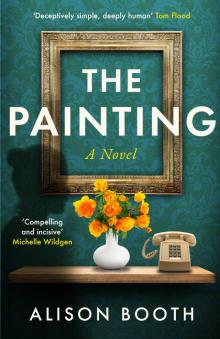 The Painting
The Painting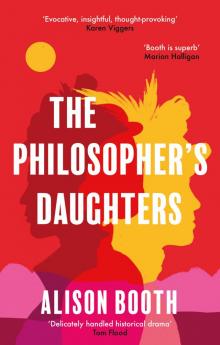 The Philosopher's Daughters
The Philosopher's Daughters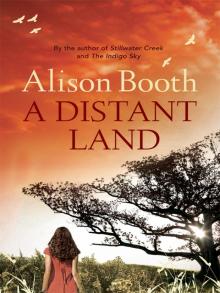 A Distant Land
A Distant Land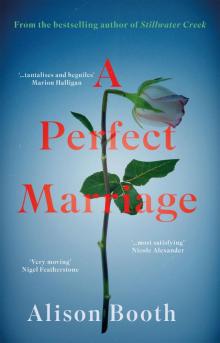 A Perfect Marriage
A Perfect Marriage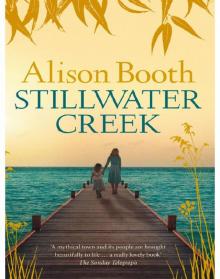 Stillwater Creek
Stillwater Creek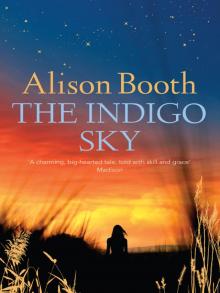 The Indigo Sky
The Indigo Sky